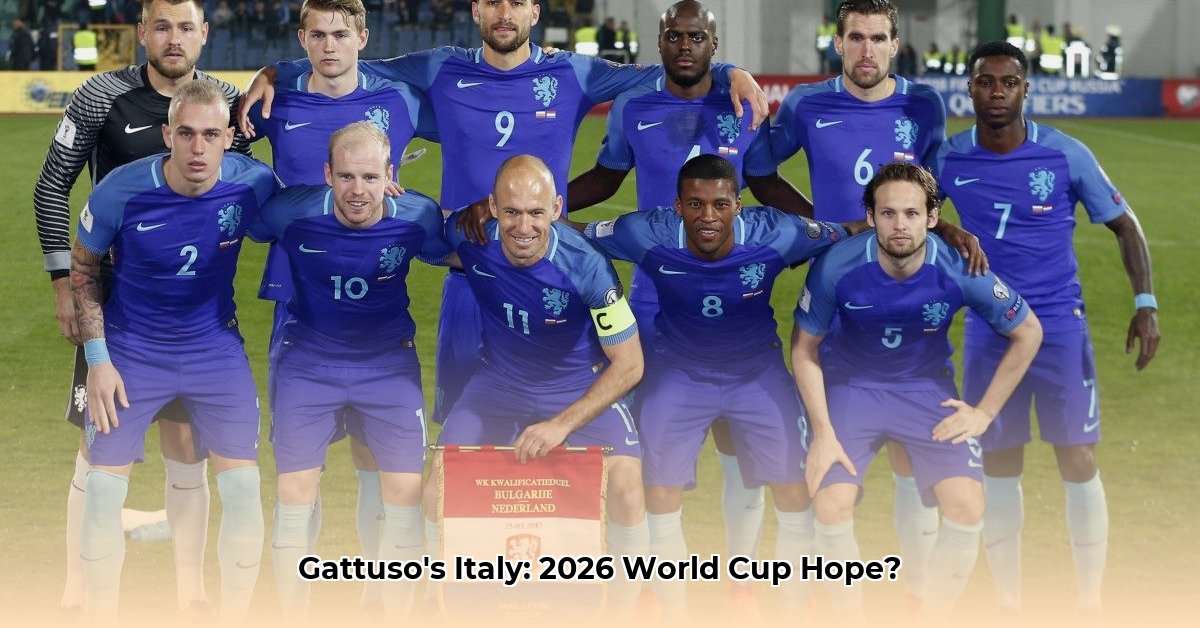
Bondscoach Italie: Can Gattuso Lead the Azzurri to Glory?
The Azzurri, Italy's national football team, has a history as rich and complex as any opera. From Vittorio Pozzo's double World Cup triumph to the more recent rollercoaster of highs and lows, the burden of expectation on each Bondscoach (national team coach) is immense. Now, Gennaro Gattuso inherits this legacy, tasked with leading Italy to the 2026 World Cup and beyond. His challenge is a compelling narrative, set against the unique backdrop of Italian football’s cyclical fortunes.
The history of Italian football management is a fascinating saga. Recall the exhilarating highs – Marcello Lippi’s 2006 World Cup victory. Then consider the disappointments under Giovanni Trapattoni and Giampiero Ventura – stark reminders of the fragility of success. These fluctuations highlight the immense pressure on the Bondscoach, demanding meticulous planning, effective communication between the coach, the Italian Football Federation (FIGC), and individual clubs. It's not merely tactics; it's about managing expectations, navigating media scrutiny, and forging strong relationships. Can Gattuso break the cycle of boom and bust that seems to plague Italian football?
Gattuso’s immediate challenge? Qualifying for the 2026 World Cup. This is non-negotiable. However, qualification is merely the first step. His long-term vision must focus on building a sustainable system. He must seamlessly integrate promising young talent into a team bursting with potential, yet lacking in consistency and stability. This delicate balance requires diplomacy and astute management. How will he blend youthful dynamism with seasoned experience? This is the critical question.
Gattuso’s tactical approach, known as a pragmatic blend of solid defence and opportunistic attacks, will likely evolve as the team matures. Initial strategies may prioritise defensive solidity, gradually incorporating attacking flair as confidence and chemistry improves. His ability to foster trust and mutual respect within the squad is crucial, as even the most brilliant tactical plans can be undone by poor player relationships. He must build trust, ensure established stars mentor younger talent, and create a cohesive unit ready to overcome adversity.
The success of any Bondscoach depends on the collaborative efforts of numerous key players. The FIGC's strategic decisions – from investing in youth development programs to offering unwavering support – are paramount. Italian clubs also have a significant role, nurturing young talent ready to represent their country. Finally, Italy’s passionate and demanding fans wield considerable influence, their unwavering support and constructive criticism crucial.
But even the most meticulously crafted plan can be derailed by unforeseen circumstances. Some potential risks include:
| Risk Factor | Likelihood | Impact | Mitigation Strategy |
|---|---|---|---|
| Failure to qualify for 2026 WC | Moderate | High | Comprehensive tactical plan; enhanced player selection; intensive training and preparation. |
| Player Injuries/Form | Moderate | Medium | Diversified player selection; proactive injury prevention; rigorous fitness regimen. |
| Internal Conflicts | Low | Medium | Clear communication; transparent decision-making; conflict resolution mechanisms. |
| Negative Media Pressure | High | Low/Medium | Proactive media engagement; positive public relations; fostering a strong team image. |
Gattuso’s path to success is undeniably challenging. However, with thoughtful planning, unwavering support from all stakeholders, and a stroke of luck, the dream of a 2026 World Cup triumph—and a brighter future for Italian football—remains attainable. The journey's trajectory is yet to be fully revealed, but the coming years will determine whether this Bondscoach can build a legacy as impressive as his predecessors.
How to Assess Italian National Team Coaching Success Beyond World Cup Wins
Key Takeaways:
- Win-loss records alone are insufficient for judging coaching effectiveness. A holistic approach is essential.
- Athlete feedback is crucial for understanding the coach-athlete dynamic and effectiveness.
- A three-step evaluation method offers a fairer assessment: data gathering, report generation, and follow-up guidance.
- Beyond results, consider player development, team cohesion, and tactical flexibility.
How do we truly measure a coach's success? Is it solely about winning the World Cup? Or is there more to it? Let's move beyond the headlines.
Assessing Gattuso's Impact: Beyond Wins and Losses
Roberto Mancini's tenure, despite European Championship success, saw performance inconsistencies. How can we assess coaching success more comprehensively? We need a framework that captures this complexity. Player development? Team spirit? Tactical flexibility? These are frequently overlooked.
Mancini's success wasn't defined solely by the trophy. He nurtured talent, setting the foundations for future triumphs. This long-term perspective is crucial. We must consider the impact on individual players, team growth, and the coach's overall legacy.
The three-step method provides a framework. First, gather comprehensive data from diverse sources—players, staff, match statistics. Second, create a report summarizing this data, highlighting measurable coaching behaviours, not just outcomes. Third, use the report for constructive feedback and improvement—an invaluable tool for assessing genuine progress.
Beyond the Score Line: A Multifaceted Approach
Think of a rugby coach solely focused on tries. They'd ignore crucial aspects like defence and teamwork. Similarly, judging coaching success needs a broader perspective. Consider:
- Player Growth: Does the coach foster individual improvement and maximise potential?
- Team Dynamics: Is there strong cohesion, unity and a positive team ethos?
- Tactical Flexibility: Can the coach adapt strategies to opponent strengths and weaknesses?
- Long-Term Vision: Is there a clear plan for player recruitment and development across multiple tournament cycles?
Winning is only one thread in a complex tapestry. Numerous other factors contribute to a well-rounded assessment of coaching performance.
The Importance of Athlete Feedback
Players' perspectives offer invaluable insight, revealing aspects statistical analysis often misses. Did the coach create a motivating environment? Was there trust and respect? Did he manage conflicts effectively? Gathering feedback provides a more balanced perspective, moving beyond simple win-loss ratios.
This holistic approach allows for a more thorough evaluation of a coach's impact, considering elements beyond purely quantitative results, leading to a more informed and nuanced assessment of their effectiveness.